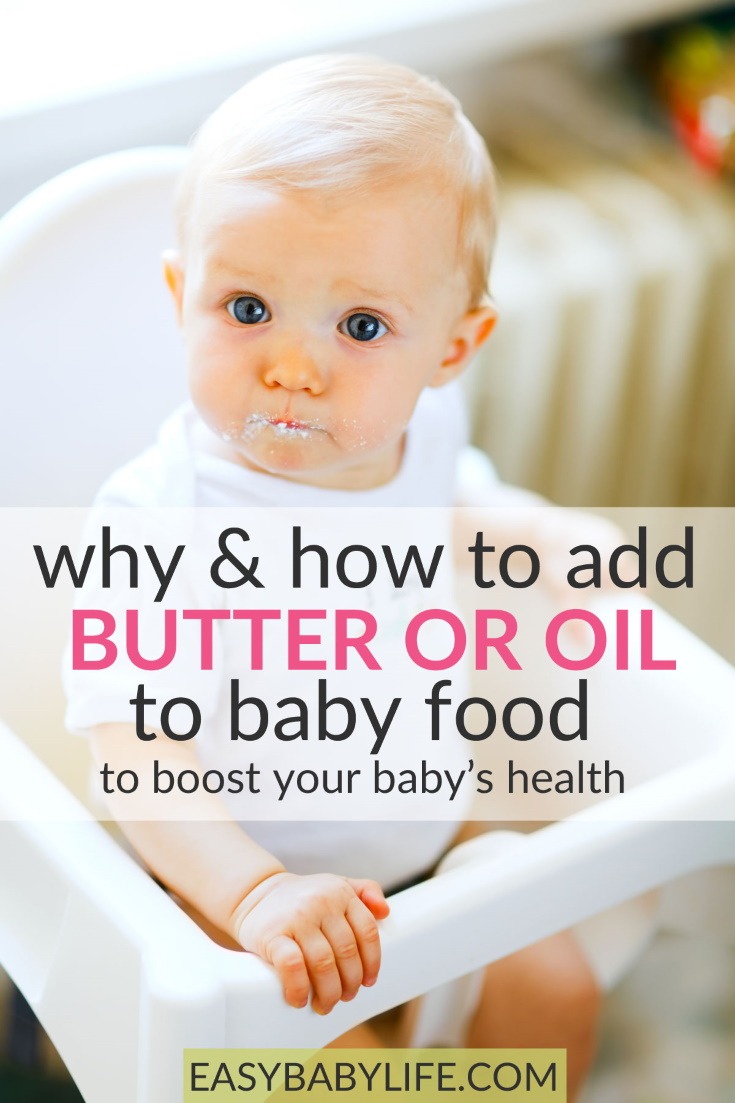Do you add oil or butter to baby food when feeding your baby? If not, then think again!
Learn why and how to add oil or butter to baby food. The right fats can actually promote brain development. Pin
Pin
When making baby food, we usually put together different vegetables, herbs, and possibly some meat or fish. Then we mix it with breast milk, formula, or water for the right consistency. The result is – hopefully – a yummy dish for your baby, but a very low-fat one.
Good or bad? Actually… not so good.
Here we will explain why adding oil or butter to baby food is a great way to promote your baby’s health and development.
Why And How To Add Fat – Oil or Butter – To Baby Food
- Why Babies Need Fat
- What Fats To Choose
- How Much Butter Or Oil To Add To A Baby’s Food
- What About Obese Babies
- What About Skinny Babies
Why Babies Need Fat
Fat is very important for your baby’s physical development. A high-fat diet supports their growth and brain development since the fat helps to build a myelin sheath around the nerves in the brain and spinal cord. This myelin sheath creates insulation for the central nervous system, making it possible for nerve pulses to travel rapidly and efficiently.
Breast milk has a high-fat content; of some 4% and comprises Omega 3 fats such as DHA and AA – very healthy.
However, if you could remove all the water from breast milk, the remaining substance would be around 50% fat. Quite a lot! So, as you can see, fat is an extremely important part of a baby’s diet.
If you make your own baby food without adding fat, the fat content will often be a lot less than 4%. If you start with solid foods early, or you do not add oil or butter to baby food that you cook, your baby may not get enough fat for optimal development.
Interestingly, despite the fact that baby food may contain less fat than breast milk and formula, several studies show that babies who are introduced to solid foods early are at a significantly higher risk of becoming overweight as pre-schoolers compared to children introduced to solid foods after the age of 4 months.
Low-fat baby food is not a way to keep your baby at normal weight.
What Fats To Choose
Now, what type of fat should you choose to add? Oil, butter, margarine? Several types of oil, as well as butter, are excellent choices! Margarine, on the other hand, is best avoided, and I’ll soon explain why.
Olive oil is well-known to be healthy, especially if using extra-virgin (organic) oil.
Olive oil contains a high degree of monounsaturated fats and the same fatty acids present in breast milk and helps promote your baby’s growth. It also contains several important vitamins, such as A, B, C, D, E, and K.
(Read about the benefits of different vitamins for your baby here.)
Coconut oil (again virgin, organic) is gaining popularity due to its composition. Coconut oil has a large content of medium-chain fatty acids, just like breast milk. Both breast milk and coconut oil are rich in lauric acid, which promotes immune defense.
There are other healthy oils too, but olive and coconut oils are good, well-documents oils for your baby.
Make sure you use extra-virgin, preferably organic oils, if you can afford it. (Virgin oils are a must if you want the oil to be healthy for your baby.)
Adding butter to baby food is a great option too.
Butter is very nutritious and provides necessary fat, cholesterol, Vitamin A, CLA, and essential fatty acids.
You should stick to unsalted butter, preferably organic, as salt can tax a baby’s kidneys, and organically produced butter will not contain the added hormones/drugs that are given to cattle raised in standard conditions.
Also, if possible, use butter from grass-fed, rather than grain-fed, cattle, as grass-fed butter will contain significantly higher amounts of vitamin A and CLA and will have a better Omega-3 fatty acid profile.
If you are worried about the milk protein content of butter, you can relax. Butter does not normally contain large amounts of milk proteins, so it should be minimally allergenic.
If the baby tolerates milk-based formula (or if the mother breastfeeds and includes dairy in her own diet), the baby is not likely to have an allergy or sensitivity to milk protein.
Then how about margarine? Avoid it! Margarine is made through a chemical process that makes it solid but also makes it full of trans fatty acids, preservatives, and chemicals. Yikes!
How Much Butter Or Oil To Add To A Baby’s Food
Assuming a baby portion is around 2 oz, add around 0.5-1 teaspoon of oil or butter to one serving.
Since frying food is not recommended for babies, you can add oil or butter to baby food after boiling or steaming the food. That way, the heat will not destroy the healthy vitamins, minerals, and fatty acids.
What About Obese Babies
When is a baby obese or overweight enough for the parents to worry?
It is a tricky and sometimes sensitive question.
Many babies are downright fat during their first few months of living, especially if fully breastfed. But once these babies start moving around and combine breast milk with solid foods, they often shed off the baby fat quite rapidly. And that is all good. Babies that are really chubby on breastmilk is nothing to worry about at all.
It is more worrying if an older baby suddenly starts gaining weight rapidly. But before worrying at all, consult your baby’s doctor! You should talk to a pediatrician before adjusting your baby’s diet.
Now let’s say that your baby or young toddler really is overweight. Does that mean that you should cut down on fat? Actually no. At least not as a first-hand option. You should cut down on sugar and simple carbohydrates, such as white flour, fast food, and fruit juices.
More and more research confirms that sugar and simple carbohydrates are the real causes of obesity.
They also cause cavities and may lead to malnutrition, since they are practically empty calories (no vitamins, minerals, proteins, or fats that are needed for development).
You should also ensure that your baby gets access to healthy fats, such as the ones described above, with medium-chain fatty acids.
Secondly, have fun with your baby! Get down on the floor to play. Chase your crawling baby or running toddler – they usually love it! Or enroll in some fun baby activities together—a perfect way to bond with your baby too.
Third, make sure your baby sleeps enough. You can review this baby sleep schedule and compare it with your own child. Lack of sleep is associated with being overweight in adults and maybe also in children.
What About Skinny Babies
Many parents worry that their baby is too skinny. We tend to envision healthy babies as chubby. But while there are many established negative health effects of a child being obese, there are very few documented negative effects of being skinny.
So unless you have reasons to believe that your baby is not getting the nutrition he or she needs, or if your baby is falling rapidly through the weight curves or appears weak or ill, you really don’t have to worry much about your skinny baby.
If your baby is happy and developing normally, just keep up with the healthy foods and add as much oil or butter to your baby’s food as you would to any child.
If your baby has an issue with being too skinny, as confirmed by your pediatrician, you are likely to get dietary advice from the doctor.
Foods that are high in healthy fats are often an excellent source of energy for these children too. Avocado is an excellent veggie to offer your baby in such a case, as is full-fat cheese and yogurt when your baby is old enough.
Some pediatricians will also recommend adding oil to the baby’s bottle.
But again, do not try to increase your baby’s weight unless your pediatrician tells you too.
Babies are not unhealthy just because they are tiny or skinny, regardless of what your grandma or neighbor says!
I hope this article has inspired you to stop worrying about doing wrong when adding oil or butter to baby food. It is perfectly safe and even healthy to give the right oil or butter to babies!
Research on Adding Oil or Butter to Baby Food
- The Role of Nutrition in Brain Development: The Golden Opportunity of the “First 1000 Days”
- Baby Formula With Fish Oil Added May Help Infants
- Feeding Your Baby’s Brain
- Efficacy of Virgin Coconut Oil supplemented-milk feeding in augmenting weight gain among very low birth weight preterm infants: A meta-analysis.
More About Feeding Your Baby
- Making your own baby food – It is easy!
- Information about children’s eating habits can be found here.
- And here’s you’ll find tips on how to avoid power struggles at the dinner table.
Feel free to share any thoughts on adding oil or butter to baby food by leaving a comment below! :-)

Paula Dennholt founded Easy Baby Life in 2006 and has been a passionate parenting and pregnancy writer since then. Her parenting approach and writing are based on studies in cognitive-behavioral models and therapy for children and her experience as a mother and stepmother. Life as a parent has convinced her of how crucial it is to put relationships before rules. She strongly believes in positive parenting and a science-based approach.
Paula cooperates with a team of pediatricians who assist in reviewing and writing articles.





